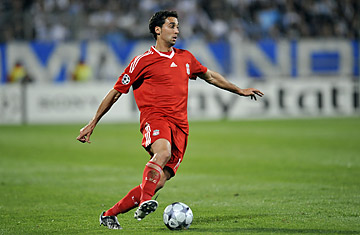
Liverpool FC's Alvaro Arbeloa in a match against Olympique de Marseille
Could the British government and the recession achieve what the best soccer teams from Spain and Italy have not been able to? English soccer clubs have dominated European competition for the past few years. They may not have always won the Champions League final, but English teams have invariably filled most of the semifinal slots. And nobody doubts that the English league is the richest and most successful in the world.
Now that is under threat — from an unlikely source. Premier League players could see their wages drop by more than a third next April thanks to a tax increase on Britain's highest earners and a fall in the value of the pound. A report this month by consultants Deloitte said the one-two punch would leave players "likely to request pay increases" and clubs facing "an increase in their wage bill or potentially losing the player to an overseas rival." The ramifications for the league could be huge. "The domination ... on that front will go," Arsenal coach Arsene Wenger said recently. "That is for sure."
The British government announced in April plans to hike the income tax from 40% to 50% for workers earning more than about $250,000 a year. With players' gross salaries averaging roughly $2 million during the 2007-08 season, the measure — slated for introduction next April — would hit the Premier League across the board. A weakened sterling, meanwhile, is adding to that pain. The currency has shed more than a fifth of its value against the euro in the past two years, plunging to all-time depths against the single currency. For players measuring their pay against the rewards on offer in Spain, Italy, Germany and France — the eurozone countries home to Europe's next four biggest leagues — the pay cut could be hard to stomach.
Take an English contract signed two years ago worth a fairly typical £3 million a year. At the exchange rate on offer at the time, the player's post-tax salary of £1.8 million would have been worth €2.7 million. Fast-forward to next April, though, and that post-tax salary becomes £1.5 million — in European money, it falls 36%, to €1.74 million. To the clubs, matching or trumping pay levels on the Continent might suddenly seem expensive. For a Premier League team to pay a player an equivalent net annual salary of €3 million next April, the cost would be €6.8 million, according to Deloitte. That's 70% more than the €4 million it would cost a Spanish team to pay a foreign player the same. Doing so in Italy, Germany and France, meanwhile, would be much cheaper too.
So is the Premier League about to lose its luster? Some stars may not hang around to find out. The rise in tax and falling pound "will make a lot of players move to Spain," Liverpool's defender Alvaro Arbeloa reckoned last month. The Spaniard's own contract, he said, was worth 30% less than when he left his country for northern England in 2005. Arbeloa now seems poised to return home with a move to Real Madrid.
Others may stand their ground — in return for compensation. When he realized after arriving at London club Arsenal in January that British taxes would leave him scarcely better off than at home in Russia, Andrey Arshavin reportedly set about renegotiating his $130,000-a-week deal. "This crisis," Dennis Lachter, the player's agent, said of the prospect of a further tax rise, "will affect not only Andrey Arshavin, but [Chelsea midfielder] Frank Lampard, Cristiano Ronaldo, the Queen of England and so on."
While the monarch has little choice but to stay, the pay squeeze may have made transfers like Ronaldo's recent move — Real Madrid agreed last month to pay Manchester United a world-record $132 million for the Portuguese winger — more likely. Money may not be every player's primary goal. "I don't believe Ronaldo will have gone to Real Madrid because [of] the relative strength of the euro against sterling," says Joe McLean, a partner and football-industry expert at business advisory firm Grant Thornton. "It was very much a footballing decision." But with Madrid and European champions Barcelona already able to match big-spending English teams like United, Manchester City and Chelsea, "the decreased tax rate in Spain means they can effectively pay a lot more money," says Pete Hackleton, a senior manger in Deloitte's Sports Business Group. Overseas footballers are taxed at just 24% in Spain. In the scramble to secure big-name signatures, "that makes Spain a lot more attractive an opportunity."
Still, the Premier League's strength in depth will make it an irresistible market for most players. Its 20 clubs generated revenue of $3.5 billion during the 2007-08 season, some $1.4 billion more than La Liga, Spain's top flight. Deloitte expects takings to have risen further last season and thinks they'll rise higher still next month. Key to that growth: bumper income from the sale of global broadcasting rights that guarantees even the smaller clubs a slice of a big pie. Finish bottom of the Premier League, and you can still expect about $50 million in TV revenues. A similarly ranked team in Spain can expect only a fraction of that.
